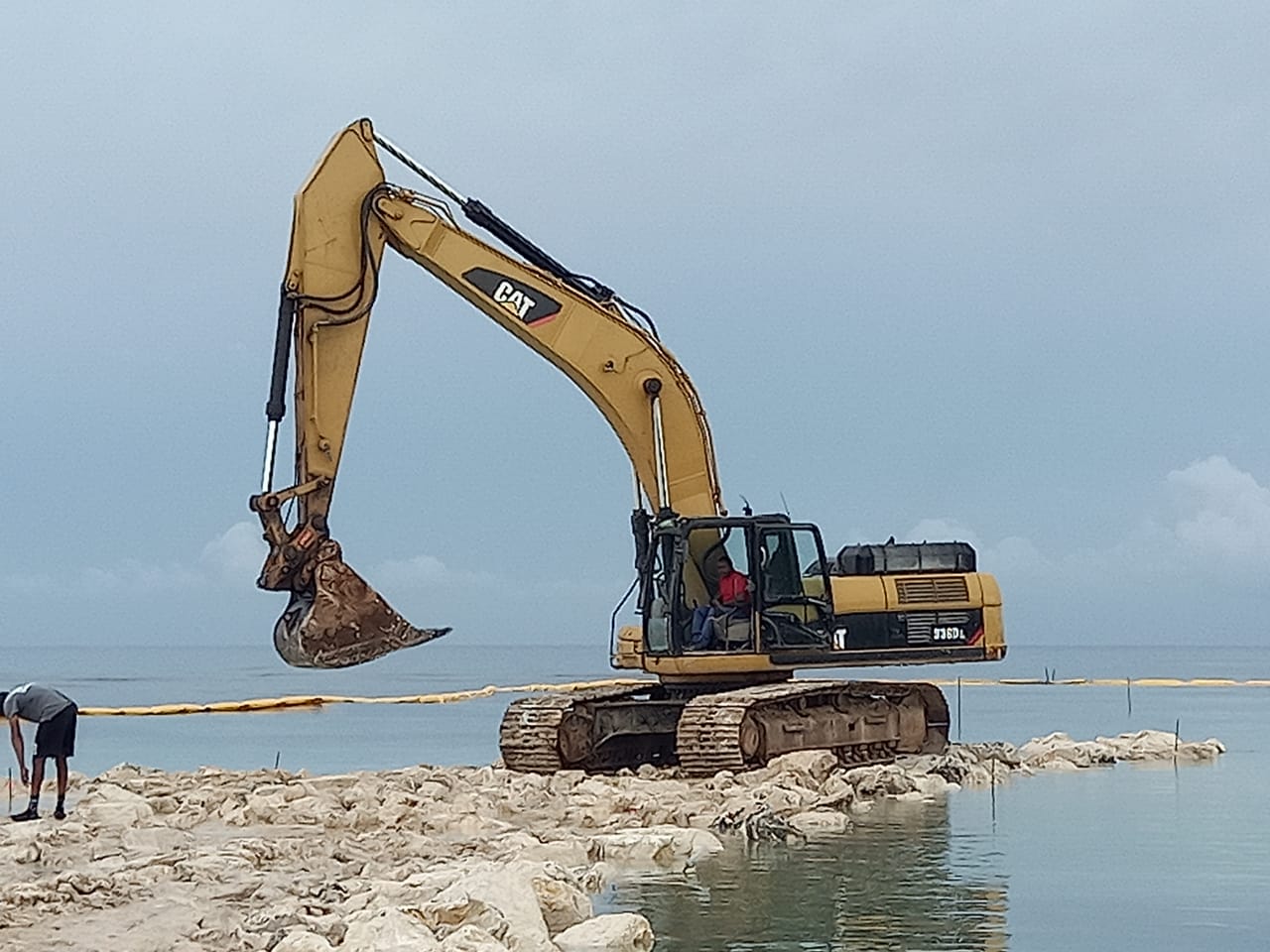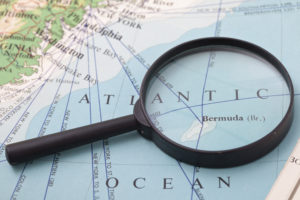 Like many other island nations, development on Bermuda began centuries ago with the establishment of ports. Settlement along the ocean’s edge followed. Except for the occasional major storm, residents and infrastructure on the islands’ coasts were safe, but with the accelerating pace of climate change and sea level rise, that could be changing.
Like many other island nations, development on Bermuda began centuries ago with the establishment of ports. Settlement along the ocean’s edge followed. Except for the occasional major storm, residents and infrastructure on the islands’ coasts were safe, but with the accelerating pace of climate change and sea level rise, that could be changing.
On 4 March 2022 Bermuda’s Minister of Home Affairs, the Honorable Walter Roban, told the House of Assembly, “These effects of climate change are a major threat to Bermuda. The sum total of these impacts has the potential to affect our very viability as a country.”
To understand and quantify (in a Bermudian context) the threats of a rapidly changing global climate, the Government of Bermuda hired Smith Warner International (SWI) to conduct a follow-up study to one conducted by SWI in 2004, focusing on how climate change could impact the island. Dr. David Smith, Smith Warner International’s co-founder, met with stakeholders in Bermuda last week, marking the official beginning of the project.
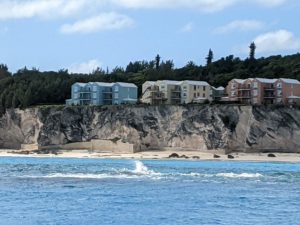 The 2004 study resulted in two outputs: “The Bermuda Coastal Erosion Vulnerability Assessment” and “Coastal Protection and Development Planning Guidelines for Bermuda”. Those reports focused on identifying vulnerable areas based on historical trends in wave and storm surge activity, sea level rise and future storm predictions at the time. “The key to achieving this balance is to ensure that the approach to armouring and development along the shoreline is cognizant of the forces of nature acting in the particular locations during a period of time,” the 2004 study read. The Department of Planning in Bermuda has been using the results of the study to guide development along the coast since that work was completed in 2004.
The 2004 study resulted in two outputs: “The Bermuda Coastal Erosion Vulnerability Assessment” and “Coastal Protection and Development Planning Guidelines for Bermuda”. Those reports focused on identifying vulnerable areas based on historical trends in wave and storm surge activity, sea level rise and future storm predictions at the time. “The key to achieving this balance is to ensure that the approach to armouring and development along the shoreline is cognizant of the forces of nature acting in the particular locations during a period of time,” the 2004 study read. The Department of Planning in Bermuda has been using the results of the study to guide development along the coast since that work was completed in 2004.
The current study will update the findings from 2004 and expand the scope, Mr. Roban explained, making “predictions specifically for Bermuda with a projection timeline for the best- and worst-case climate change scenarios over the short-, medium-, and long-term time frames.”
Smith Warner International’s Project Manager, Edward Albada, says “Because much of the development, not just on Bermuda but everywhere in the Caribbean, begins on the water line and then extends inland, you can’t just move everything back. There’s not a lot of room for retreat.” Edward continues, “This study is all about assessing what areas are vulnerable, especially critical infrastructure such as evacuation roads, power generation and water treatment plants.” But it’s far more comprehensive. Salt water intrusion from flooding threatens the freshwater lens, which may affect drinking water and water used for irrigation.
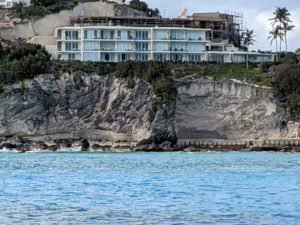 In his remarks to the House of Assembly, Mr. Roban listed the airport, the solar farm on the airport finger, public highways, the port infrastructure in Hamilton and St George, the dockyard cruise terminal, energy production and distribution facilities, sewage management systems, and some hotels among the infrastructure threatened by the effects of climate change. He also included low-lying residential land and Bermuda’s south shore beaches and cliffs, including those popular with the tourism industry, as areas at risk.
In his remarks to the House of Assembly, Mr. Roban listed the airport, the solar farm on the airport finger, public highways, the port infrastructure in Hamilton and St George, the dockyard cruise terminal, energy production and distribution facilities, sewage management systems, and some hotels among the infrastructure threatened by the effects of climate change. He also included low-lying residential land and Bermuda’s south shore beaches and cliffs, including those popular with the tourism industry, as areas at risk.
It’s not only the built environment that’s threatened. The latest Intergovernmental Panel on Climate Change (IPCC) report released on 28 February 2022 sounded another alarm that corals, seagrass, and mangroves are dying or deteriorating at an increasing pace. All three play an important role in coastal protection, helping to attenuate waves. The Bermuda Institute of Ocean Science and others are studying Bermuda’s corals, which appear to be more resilient and adaptable to temperature changes than those in the Caribbean and Australia’s Great Barrier reef. Nevertheless, the stability of Bermuda’s shorelines are directly related to the continued integrity and health of the corals that form a protective ring around the island nation. Without these, the islands of Bermuda would be subjected to intense wave action and erosion.
Bermuda’s climate change task force and fiscal responsibility panel urge the nation’s focus to be on “resilience by reducing Bermuda’s vulnerability to extreme weather events, sustainable development, improving ocean and coastal management, and leveraging the opportunities offered by Bermuda’s natural mangrove and seagrass carbon sinks”.
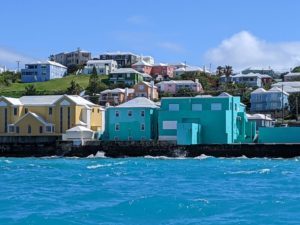 Smith Warner’s Director of Quality and Innovation, and company co-founder Dr. David Smith says, “We are honored to be working again with the Government of Bermuda. We greatly respect their ongoing efforts to protect their coasts, their people, their economy, and natural resources from the predictable – and unpredictable – effects of climate change.”
Smith Warner’s Director of Quality and Innovation, and company co-founder Dr. David Smith says, “We are honored to be working again with the Government of Bermuda. We greatly respect their ongoing efforts to protect their coasts, their people, their economy, and natural resources from the predictable – and unpredictable – effects of climate change.”
The U.K. has granted an initial amount of US$200,000 for the climate study. The findings from the study will help the Government of Bermuda to address and prioritse adaptation measures. Mr. Roban also said that the research will help landowners in Bermuda make informed choices about future development on land that may be affected by rising sea levels.

